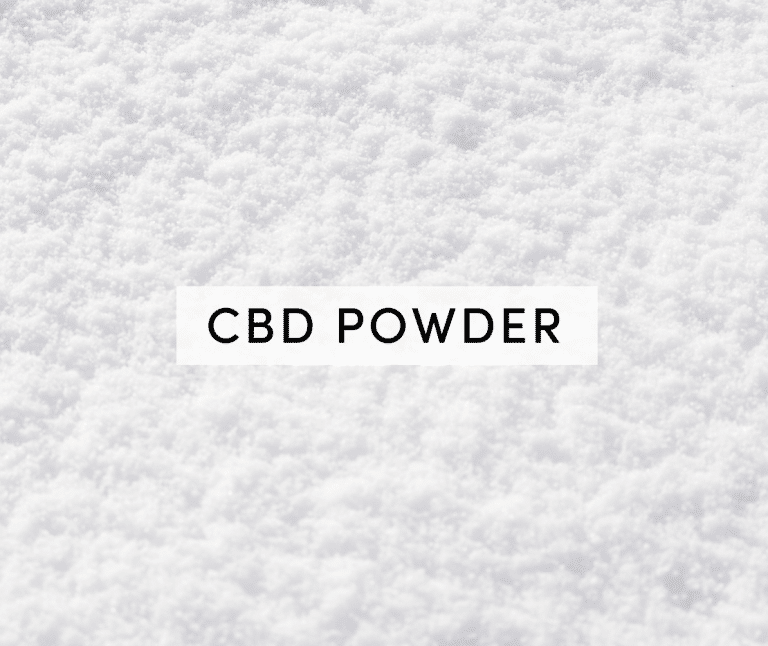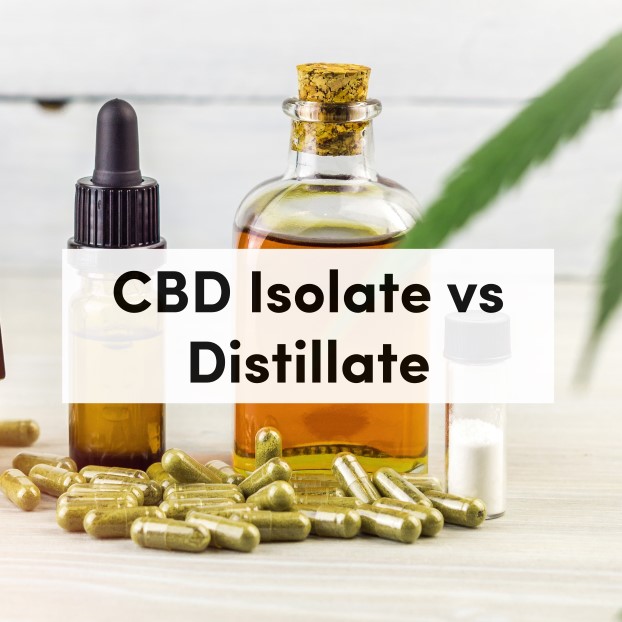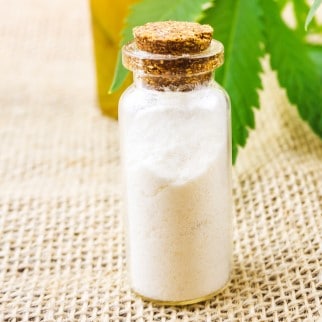CBD Powder: Is Being Pure Cannabidiol a Good Thing?

Posted on March 30th, 2021
By now, you’ve probably heard of the term ‘CBD’. If not, you’ve missed out on the developments around this super compound that may become a great alternative to some drugs. Already, various CBD products are being used for several potential benefits and seemingly incredible results. Even with the popularity of CBD, the details behind this compound are confusing to many. As a result, most people associate it with marijuana, which infamously induces a “high” feeling. To demystify CBD, it is important to first understand the various compounds in the cannabis plant. Where do they come from and how do they interact with the human body? Every cannabis product has different strengths and weaknesses. This article discusses CBD powder specifically, along with other products, cannabinoids, and how they all work together.
Cannabinoids
The cannabis plant contains over 400 chemical substances. Of these, about 100 are cannabinoids. These are naturally occurring compounds that can interact with the human body through cannabinoid receptors. The most renowned cannabinoids in the cannabis sativa plant are THC and CBD. However, others are gaining relevance with continued studies.
Tetrahydrocannabinol (THC) is popular as it is responsible for the intoxicating properties of cannabis. Unlike THC, using CBD or CBD powder doesn’t get you “high.” This makes CBD more suitable for medical purposes. Other less popular but essential cannabinoids in the cannabis plant include cannabinol (CBN), tetrahydrocannabinolic acid (THCA), cannabigerol (CBG), cannabidiolic acid (CBDA), and cannabichromene (CBC).
But where do these compounds come from? It is important to note that there are different groups of cannabinoids. Generally, you can break them up as endocannabinoids, phytocannabinoids, and synthetic cannabinoids.
Endocannabinoids occur naturally within the human body in amounts that depend on the body’s needs. Phytocannabinoids exist in plants such as the cannabis sativa plant. These compounds come from the trichomes, or resin glands, particularly on the leaves and flowers. While other plants produce cannabinoids, they occur in the highest concentration in cannabis. Synthetic cannabinoids are those made in a lab to mimic the effects of the natural cannabinoids.
 How Do Cannabinoids Work?
How Do Cannabinoids Work?
All cannabinoids work by interacting with the body’s endocannabinoid system. The endogenous cannabinoid (endocannabinoid) system is an extensive neuromodulatory system. It consists of cannabinoid receptors (CB1 and CB2), endocannabinoids, and the enzymes that facilitate the activity of these endocannabinoids.
The ECS plays essential roles in the body. Central nervous system development, responses to endogenous and environmental stimuli, and synaptic plasticity are some of these. Cannabinoids bind with CB1 or CB2 receptors thereby influencing communication between body cells. When CBD powder enters the system, it goes to work to figure out where the ECS needs it.
What is CBD?
Cannabidiol (CBD) is one of the many natural cannabinoids in the cannabis plant. CBD makes up about 40% of hemp extract, and has many potential health benefits. Unlike THC, CBD isn’t psychotropic and will not make you “high.”
The range of health benefits are somewhat due to its anti-inflammatory and anti-depressant properties. These properties lend to potential treatment for inflammation and pain, anxiety, acne, seizures, and even cancer symptoms like nausea and vomiting.
Extraction: First Step to CBD Powder
Extracting the CBD is the first step before you can use it in your favorite product. Since it is an abundant compound in the hemp plant, the extraction process isn’t terribly complicated. The most advanced methods are more complex, but there are simpler methods too. The process involves isolating the compound from the plant materials (flowers and leaves) and distilling it to get CBD powder.
For commercial purposes (large-scale), the carbon dioxide and solvent extraction methods are the most applicable. Home extraction may be useful if you wish to extract small amounts of CBD for your own use.
Home-based CBD extraction involves heating the dry cannabis materials (flowers, leaves, and stalks) and using a carrier oil to extract. Making CBD powder at home is nearly impossible due to the complexity of the procedure. Heating decarboxylates the cannabis, which is necessary for converting the inactive CBDA to its active form (CBD). The temperature should be around 220F, preferably in an oven, for about an hour to allow for maximum conversion.
After an hour, let the cannabis materials cool. Next, add a carrier oil, such as coconut oil, and place the mixture in a hot water bath to avoid scorching the oil.
Check on the mixture and stir at 30-minutes intervals. After 2-3 hours, the CBD should have sufficiently dissolved into the oil. You can use coffee filters or a cheesecloth to separate the oil from the plant materials.
Extracting CBD from Marijuana
Before looking at the extraction of CBD from marijuana, it is important to ask this question: is cannabis different from marijuana? While there may be no real difference, “cannabis” is the broader term or classification into which marijuana and hemp plants fall. Simply put, marijuana is a variety of the cannabis sativa plant. In other words, all marijuana is cannabis, but not all cannabis is marijuana.
Getting CBD from marijuana isn’t any different from the aforementioned extraction process. However, it is worth noting that the CBD extracted from marijuana will contain more THC. Using varieties of cannabis like the hemp plant can help ensure that the CBD contains very little THC. The main benefit of that is for legal reasons. If the final product contains more than 0.3% THC, it is federally illegal. That is why many people choose pure CBD powder.
Does All CBD Contain THC?
This question comes up often, as most people are concerned with the risk of ingesting THC whenever they use CBD. For this question, the simple answer is no – not all CBD will contain THC. If you choose to purchase CBD oil, you could be buying any of the following:
- Broad Spectrum CBD oil from hemp contains many hemp compounds but zero THC.
- Full-spectrum CBD extract comes from cannabis or hemp. It contains a range of cannabinoids and terpenes, including some THC. Hence the name “full spectrum.” Many scientists believe that using all possible parts of the hemp plant together provides the greatest benefits.
Broad Spectrum CBD
Broad spectrum CBD is one of the three main forms of CBD on the market. Essentially, broad spectrum CBD does not contain THC but will contain other compounds from the cannabis plant such as terpenes. Broad-spectrum CBD will not get you ‘high,’ and can provide some of the ‘entourage effect’ (various compounds working together).
CBD Isolate Crystals
CBD isolate refers to the pure form of CBD. This means it doesn’t contain THC and other plant compounds like terpenes. Chromatography is the extraction process necessary to remove any other compound other than CBD. This process also removes other impurities to help produce CBD that is almost 100% pure. The distillate at the end of the process cools quickly, which makes the solution supersaturated. That’s when CBD crystals form. Then, as nucleation starts (the initial stage of crystallization) you must stir the solution vigorously. This process enhances the formation and separation of CBD crystals from the solution.
CBD Powder
A relatively new product on the market today is CBD powder. Grinding CBD isolate crystals is what generates this powder. Since this product comes from CBD isolate crystals, it will mostly have no flavor or smell. Therefore, it is easier to consume and contains a higher percentage of CBD than other CBD products.
Advantages of CBD Powder
CBD powder doesn’t contain any THC. This means that users can enjoy the benefits of CBD without the intoxicating effects of THC. CBD powder has demonstrated various potential benefits, such as pain relief, inflammation, and anxiety relief. It may also ease symptoms of cancer treatments such as nausea and vomiting.
 CBD Powder vs Full Spectrum CBD
CBD Powder vs Full Spectrum CBD
The fact that CBD powder contains only CBD and no other compounds doesn’t make it stronger than full spectrum CBD. In fact, the general belief is that users have a better experience by using full spectrum CBD products. Experts believe that together, the various compounds in the cannabis plant have a synergistic power that results in a better experience. The result is called the full spectrum entourage effect. The only real advantages to CBD powder are that it is completely legal in the US, and has no taste or smell.
Summary
Cannabinoids are compounds in the human body and plants that influence the endocannabinoid system. These compounds form many types of popular cannabis products. However, CBD powder delivers the power of CBD without the risk of ingesting THC. As a result, users will not experience the ‘entourage effect,’ which is the full potential of CBD. Depending on what you need, it is important to choose carefully between the products available to you. More importantly, you should always consult your doctor before deciding to try any new supplemental medicine or product.






